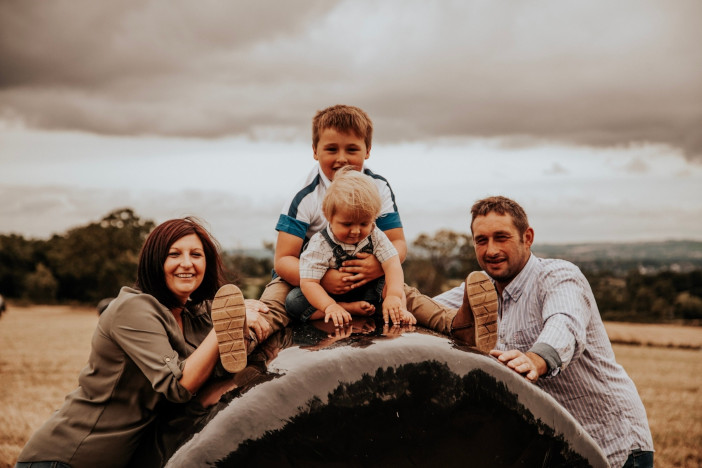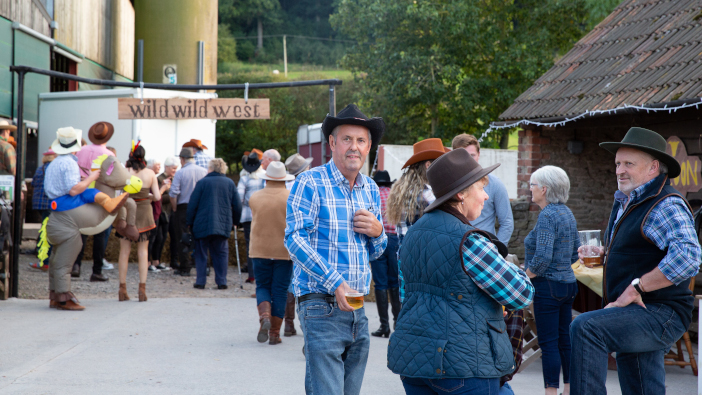A new mental health charity based in Hereford is offering training and support to farmers and their families to break the stigma around opening up.
When Sam Stables reached his breaking point, it was the culmination of several factors. He explained that he used to thrive under pressure, so ignored the warning signs that were building up with long hours, isolation and other concerns. His wife Emily, who helps run their diversified farming business, explained that she didn’t recognise the warning signs until it was too late.
“He was manically happy the week before it happened,” she said. “I obviously knew about the pressures, but it didn’t seem to be affecting him particularly. It wasn’t till after he was admitted to hospital that I realised what it meant.”
Sam attempted suicide. Luckily he survived but it was a series of things that farmers and contractors accept day-to-day that led him to believe that it was the only way out. When he was released from hospital, friends and members of the rural community came to him and asked why he hadn’t spoken to them previously.
“I’d always felt that I would be burdening them if I said I was having trouble,” Sam explained. “That couldn’t have been further from the truth. Talking to them could have helped me get some perspective and possibly stopped me spiralling.”
Sam and Emily explain that agriculture is unique. While there is a growing recognition among the new generation of farmers, the older generation carries the burden. They internalise their feelings and normalise this ‘carry on’ attitude. “It’s disheartening when our industry has an above average suicide rate and most people know someone who has died due to this.”
To help the industry that both of them love, Sam and Emily set up We Are Farming Minds, a charity designed to give people the tools to recognise when someone needs help, and to provide the help for people who reach out.

“One thing we recognised was that it’s incredibly difficult to get the support,” Sam explained. “The NHS waiting list for support can be months and unfortunately, that could be too late for a lot of people.”
They also recognised that farming people want to speak to someone who understands the industry. When they started We Are Farming Minds just before the Covid pandemic, they both agreed that the people who underwent training and manned their phone lines would have some agricultural experience.
“Having an agricultural background gives them a common ground to start a conversation, and it also means that they can understand the pressures,” Emily said. “It’s no good having a trained therapist who advises a farmer to stop doing something that causes stress. It isn’t that easy in this industry.”
We Are Farming Minds has several avenues to help people. Preventing someone from reaching their breaking point is the key aim and the first part is offering free mental health awareness courses for people in the industry. So far over 150 people have taken part and this training will help them recognise the signs when someone is struggling. This isn’t just available to farmers, but to people who interact with farmers.
“We’ve had vets, dealers and agronomists take part in the training,” Emily said. “By doing this we can build a culture within the industry and start these conversations. These people are sometimes the only contact with others that farmers have for days or weeks at a time. Especially during the pandemic. These are the people who could recognise the signs and potentially help someone.”
Another aspect has been events, held in the local area but with a view to expand this as the charity grows. These fundraising events are not focused on discussing mental health. They are fun, family days out, offering the chance for farmers to socialise and enjoy themselves.
“We don’t want to force this down their throats but we do want to build awareness, while giving them the opportunity to break their routine,” Sam said.

Perhaps the main part of We Are Farming Minds will be its helpline, which went live on the 1st of February. The helpline is a freephone number that farmers and their families can call or text. It does not show up on bills, so those who feel any embarrassment are protected.
“It’s going to be available 24 hours a day, seven days a week,” explained Emily. “We have 25 volunteers, all of whom have taken a course with Samaritans and another 12 trainees. We were lucky enough to get funding from the National Lottery to help pay for that training and set the phone line up.”
As well as offering help to farmers, Sam and Emily are hoping to set up a sub-group for those who have retired from the industry. Tentatively called One Foot in the Grain, the group will help those who have the industry meet up with friends and get out of the house.
“The problem is that farming is your life,” Sam said. “It’s not like any other job. This means that when they retire or have to step away it can be a massive blow. Not only that, but it can take away the social scenarios that they are used to. They stop seeing their workers, possibly stop going to sales and events. If farming is isolated already, imagine how difficult it is for them.”
While Covid hampered the setup of We Are Farming Minds, Sam and Emily are positive that the pandemic has only increased awareness of the impact isolation can have on people’s mental health. “For the first time, the general population has some idea of what a farming life is like.”
If any of our readers would like to get in touch with We Are Farming Minds, they can call the helpline on 0808 802 0070 or text 07786 203 130, or go to www.wearefarmingminds.co.uk


